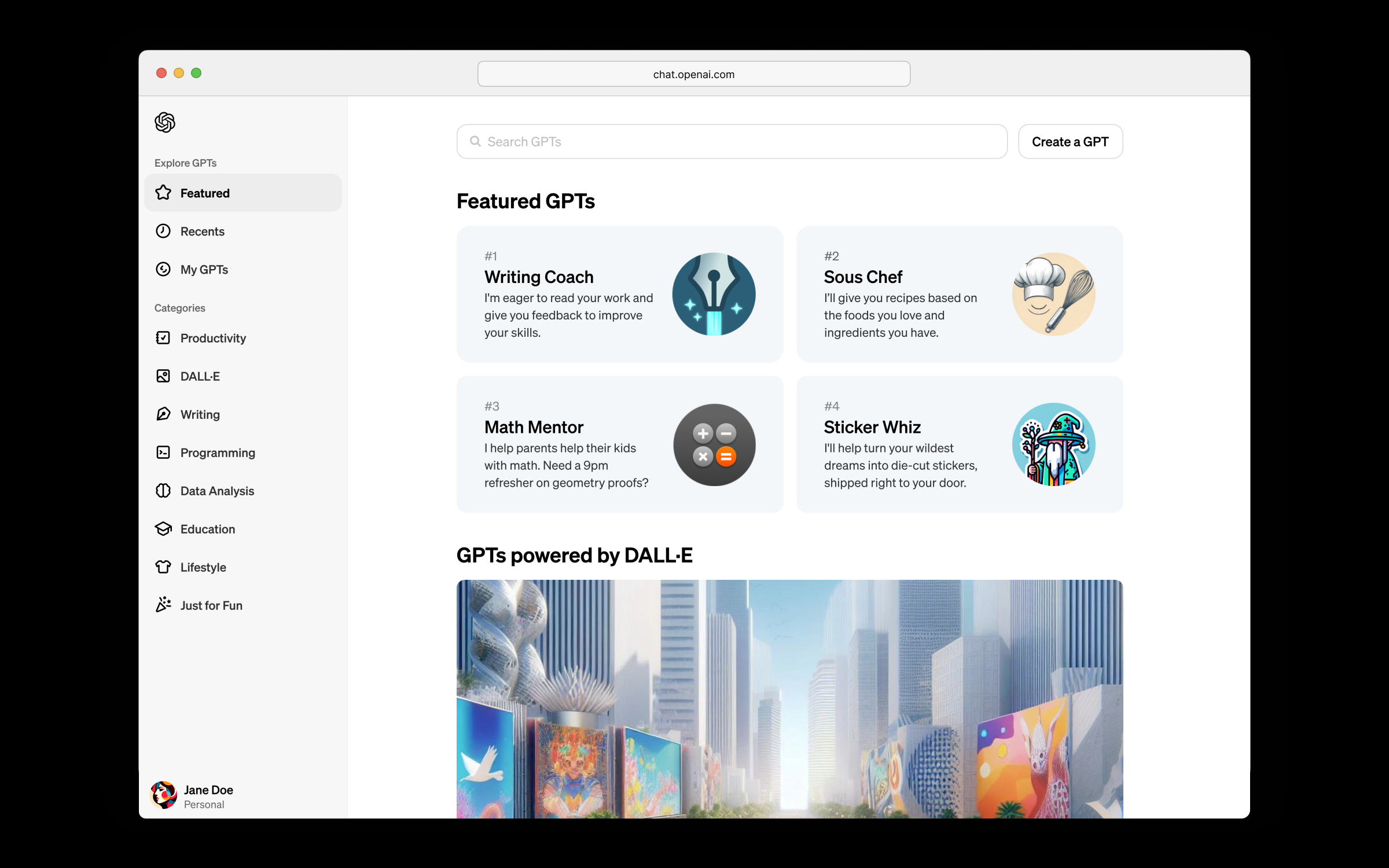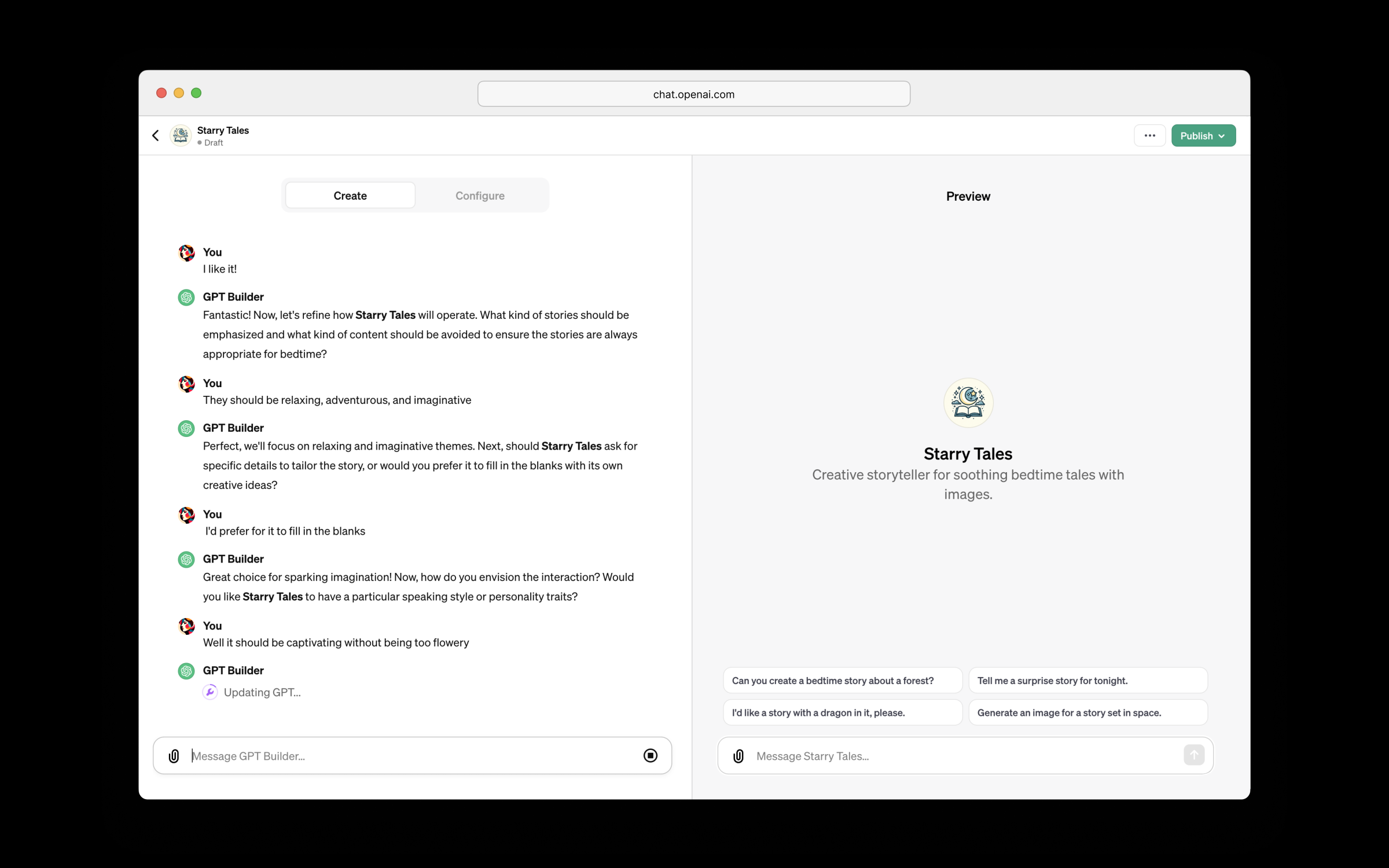
Users will soon be able to make customized versions of ChatGPT, the maker of the tool OpenAI said Monday as it made a series of announcements at its first Developer Day conference in San Francisco.
OpenAI is calling the customizable versions of ChatGPT “GPTs,” which it says will be able to comply with specified instructions and have access to user-provided information.
“The upsides of this are going to be tremendous,” OpenAI CEO Sam Altman said on stage on Monday. “It gives agency to everyone.” ChatGPT currently has 100 million weekly active users, Altman added.
“GPTs are a new way for anyone to create a tailored version of ChatGPT to be more helpful in their daily life, at specific tasks, at work, or at home—and then share that creation with others,” the company said in a blog post. “Anyone can easily build their own GPT—no coding is required.”
OpenAI said it plans to launch a GPT store, where popular tools made by “verified builders” can be accessed more widely. “Once in the store, GPTs become searchable and may climb the leaderboards,” the blog post said. “We will also spotlight the most useful and delightful GPTs we come across in categories like productivity, education, and ‘just for fun’.” The company said users would, “in the coming months,” be able to earn money based on the number of people using their GPT.

Users’ chats with a GPT will not be accessible to its designer, OpenAI said. The designer of a GPT will have the choice of whether users’ chats can be fed back to OpenAI to train its models. GPTs can also include functionality that allows developers to integrate them with other internet-connected services; users will have to opt-in for their information to be sent to those services, OpenAI said. Users will not be able to build GPTs that violate OpenAI’s content policies, which prohibit violent and sexually explicit types of content, among others.
OpenAI has long hinted that customizable and increasingly autonomous AI models will form a significant part of its future offerings – and the company doubled down on those hints on Monday. “GPTs will continue to get more useful and smarter, and you’ll eventually be able to let them take on real tasks in the real world,” OpenAI said in its blog post. “In the field of AI, these systems are often discussed as “agents”. We think it’s important to move incrementally towards this future, as it will require careful technical and safety work—and time for society to adapt.”
More From TIME
Among OpenAI’s other announcements on Monday: a fresh user interface for ChatGPT, a new version of its state-of-the-art GPT-4 model, a new text-to-speech AI model, and a pledge to cover the legal costs of developers hit with copyright lawsuits.
Legal cover for copyright claims
OpenAI said it would pay legal costs for any of its customers who face copyright infringement lawsuits stemming from the use of its business-facing generative AI models.
That commitment brings OpenAI in line with Google and Microsoft, which have made similar pledges to encourage the uptake of their generative AI technologies, amid legal efforts by some writers and artists who claim that AI text- and image-generation tools violate their copyright.
“OpenAI is committed to protecting our customers with built in copyright safeguards in our systems,” the company said in a blog post on Monday. “Today, we’re going one step further and introducing Copyright Shield – we will now step in and defend our customers, and pay the costs incurred, if you face legal claims around copyright infringement.”
Generative AI tools, such as ChatGPT and the image-generator Dall-E, have come under fire from writers and artists because they are trained on large corpuses of written and visual information—including books and photos—much of it allegedly accumulated from the internet without the permission or even the knowledge of its creators. OpenAI is facing several lawsuits alleging copyright infringement and the company recently denied in court that training AI on books infringed authors’ copyrights, adding that the text ChatGPT generates is not similar enough to that work to break copyright law.
GPT-4 Turbo rollout
Many of Monday’s other announcements were oriented towards OpenAI’s business customers, or developers, who use the AI lab’s systems to add artificial intelligence capabilities to their products. Altman said on stage at the Developer Day that 92% of Fortune 500 companies are building AI tools based on OpenAI’s systems.
Among those announcements: a new version of OpenAI’s state-of-the-art GPT-4 model, called GPT-4 Turbo. The cost of interacting with GPT-4 Turbo will be three times lower than interacting with GPT-4, OpenAI announced—a reflection of growing competition in the large language model market. Announcing the price reductions on stage, Altman received whoops and applause from the audience.
The new version of the model, available only to developers to begin with, can access information about the world up to a cut-off date of April 2023 (expanded from September 2021). “We will try to never let it get that out of date again,” Altman said.
GPT-4 Turbo also has a significantly longer “context window,” or the amount of information it can ingest in a single prompt. “GPT-4 Turbo is more capable and has knowledge of world events up to April 2023,” OpenAI said in a blog post. The new context window allows for prompts containing the equivalent of around 300 pages of text, the company said, up from around 50 pages previously. “You’ll notice that the model is much more accurate over a long context,” Altman said on stage Monday.
OpenAI also announced it would be launching a “very limited (and expensive)” program to allow companies with “extremely large proprietary datasets” to work with OpenAI’s machine learning engineers to build custom AI models based on GPT-4. “Proprietary data provided to OpenAI to train custom models will not be reused in any other context,” the company said.
Microsoft CEO Satya Nadella briefly appeared on stage at the event to discuss his firm’s partnership with OpenAI. “We love you guys,” he told Altman.
More Must-Reads From TIME
- The 100 Most Influential People of 2024
- Coco Gauff Is Playing for Herself Now
- Scenes From Pro-Palestinian Encampments Across U.S. Universities
- 6 Compliments That Land Every Time
- If You're Dating Right Now , You're Brave: Column
- The AI That Could Heal a Divided Internet
- Fallout Is a Brilliant Model for the Future of Video Game Adaptations
- Want Weekly Recs on What to Watch, Read, and More? Sign Up for Worth Your Time
Write to Billy Perrigo at billy.perrigo@time.com